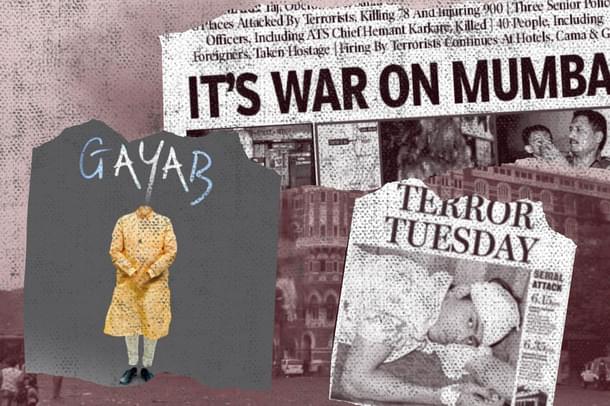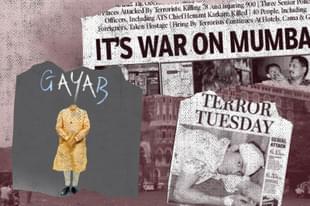Politics
Politics Over Pahalgam: Don’t Let Cheap Posters Undermine A Decade-Long Record Of Keeping Islamist Terrorism In Check
Aravindan Neelakandan
Apr 30, 2025, 07:18 PM | Updated 11:39 PM IST
Save & read from anywhere!
Bookmark stories for easy access on any device or the Swarajya app.


On the evening of 28 April, the official X handle of the Congress party tweeted an image which showed a kurta-adorned torso, resembling Prime Minister Narendra Modi, without hands and head. The image was accompanied with a single-word caption, 'Gayab' (missing).
This was meant to be the Congress party's jibe at PM Modi for allegedly being 'missing in action' at a crucial time.
The Pahalgam massacre, where Islamist terrorism once again bared its cruel fangs, slaughtering 26 innocent tourists in a chilling act of religiously targeted violence, has ignited fury across India.
Yet, in the shadow of this tragedy, politics rears its predictable head.
Shrill cries demand the resignations of Modi and Shah, proclaiming their failure, while others urge India to be an Israel.
While the top leaders of the Congress profess their support to the government, their social media handles post images like the one described above. (The image was later deleted from the Congress handle).
The Congress-aligned and Congress-aided ecosystem goes one even step further. They pin the entire blame of Pahalgam not on Pakistan but on intelligence and security failure (implying that wherever there is inadequate security in Kashmir, Hindus would obviously be killed), or allege that rather than providing leadership in this sensitive times, PM Modi would use the tragedy to his political advantage.
Videos claiming the latter also have an undertone of subtly legitimising the 'false flag' narrative that Pakistan is running over the Pahalgam massacre.
Not to stay behind, some of allies of the Congress have asked for Union Home Minister's Amit Shah's resignation. Sanjay Raut of the UBT Shiv Sena called Amit Shah the 'most failed' home minister. He even blamed Amit Shah and BJP for the religious profiling carried out by the Pahalgam terrorists: “Even Muslims have died in this attack. If religion was asked, then it is the responsibility of the BJP and its communal politics. Isn’t Amit Shah responsible?"
Narendra Modi, Amit Shah, and India's security
Here one needs to look into the charge of Modi and Shah’s alleged failure. Were there lapses? Undeniably—such an attack could not have occurred otherwise. Yet, under Modi and Shah’s leadership, India has witnessed a profound, systemic transformation in its anti-terrorism operations.
To understand that let us refresh our memories of pre-2014 days.
The reign of terror that scarred the country under the United Progressive Alliance (UPA) was relentless. With chilling precision, jihadists struck sacred Ayodhya, spilling blood on hallowed ground. In Delhi, they turned Deepavali’s festive joy into a massacre, bombs shredding 70 Hindu shoppers in crowded markets. Varanasi, the eternal city, reeled from synchronized atrocities at Shri Sankatmochan Mandir and the Cantonment Railway Station, where 28 lives—mostly Hindus—were snuffed out. Mumbai’s lifeline trains became graves for 209 Indians, obliterated in a series of bomb blasts.
This was the price of the UPA repealing the Prevention of Terrorism Act (POTA) in 2004, a reckless measure that empowered jihadist capacity building. By 2008, Lashkar-e-Taiba dared to strike beyond Kashmir, attacking a CRPF camp in Uttar Pradesh’s Rampur. Worse, the UPA concocted the myth of ‘Saffron Terrorism’ to shield the guilty, conceal its own incompetence and vilify the innocent.
In September 2008, five bomb blasts ripped through Delhi, claiming 36 lives. Then came the 26/11 Mumbai attacks, a barbaric siege where jihadists slaughtered Indians while receiving live instructions from their handlers in Pakistan. Varanasi bled again in 2010. Mumbai was bombed yet again in 2011, with 26 more lives blown out of existence.
And the UPA’s response? Inaction. Pakistan, the terror fountainhead, faced no consequences. Efforts to crush terror networks were sabotaged. When terrorists fell in encounters, the ruling elite mourned their loss. Courageous police officers were persecuted, booked, and broken. Media apologists trivialized the carnage, dismissing bomb blasts as ‘teeny weeny jobs’. The value of an Indian life was reduced to nothing.
This was the security situation Narendra Modi inherited in 2014. Since then, under his team, which has included Ajit Doval since 2014 and Amit Shah since 2019, India has secured itself from attacks it was previously vulnerable to.
We may never know the names of the people who made this possible, their missions, or the dangers they faced to keep our streets, temples, and festivals safe. But their legacy is undeniable: a nation reclaimed from the jaws of terror.
When terrorists struck an Indian Army base in Uri, Jammu and Kashmir, on September 18, 2016, killing 19 soldiers, the Modi government shattered the mould of India’s historical 'restraint'. The attack, attributed to Pakistan-based Jaish-e-Mohammed (JeM), was a brazen provocation, but what followed was a response that reverberated internationally. On the night of September 28-29, 2016, Indian Army commandos crossed the Line of Control (LoC) into Pakistan-administered Kashmir, conducting surgical strikes on multiple terror launch pads.
Then the next major attack would come only in 2019 when Pakistan-based terrorists tested India’s resolve again, expecting perhaps a softer response with elections looming and a potential regime change. On February 14, 2019, a suicide bombing in Pulwama, Jammu and Kashmir, claimed by JeM, killed 40 Central Reserve Police Force (CRPF) personnel—the deadliest attack on Indian forces in decades. The Modi government’s response was swift, and unprecedented: on February 26, 2019, the Indian Air Force (IAF) conducted airstrikes deep inside Pakistan’s Khyber Pakhtunkhwa province, targeting a JeM training camp in Balakot.
The Balakot airstrike was a revealing assertion of India’s new security doctrine. For the first time since 1971, Indian jets penetrated deep into Pakistani territory—not just Pakistan-administered Kashmir but mainland Pakistan—shattering the myth of Pakistan’s inviolability. The ‘Surgical Strike 2.0,’ forced Pakistan to shut its airspace, a tangible sign of the heavy price it paid for sponsoring terror. Modi’s government had changed the rules: every attack on Indian soil now had a cost.
Beyond high-profile military operations, the Modi government’s unacknowledged strategy seemed to also include a shadowy campaign targeting terror operatives abroad, particularly those involved in past attacks on India. From 2019 onward, reports have been emerging of key figures linked to anti-India terror groups meeting untimely ends in mysterious shoot-outs or incidents outside India.
Since 2019, at least 15-20 high-profile terror operatives, including members of JeM, LeT, and Hizbul Mujahideen, have been reported killed in Pakistan, the UAE, and Canada under mysterious circumstances. These incidents often involved targeted shootings or staged accidents, with no group claiming responsibility, pointing to covert operations. The pattern continues well into 2023: a key Lashkar-e-Taiba (LeT) operative involved in the 2008 Mumbai attacks was killed in a targeted shooting in Karachi, Pakistan, by unknown assailants. For the record, Indian authorities have never stated they had any role in these incidents and many of them were indeed later revealed to be the result of gang-wars or personal rivalries.
In Kashmir itself, since the abrogation of Article 370, data shows a significant reduction in terror incidents, with a 70 per cent drop in terror attacks and an 80 per cent decrease in civilian deaths.
Tourists, including the leader of the opposition, Rahul Gandhi, revelled in its snow-draped splendour. A newly-established Devi Sharada temple came up at Teetwal.
All these need to be taken into consideration before we start hurling stones at the very people who stand between Indians and the terrorists.
Yes. While there can be and there are legitimate criticisms of Modi government in other areas, their commitment to national security and counterterrorism is undeniable. It is important to recognize this fact and give it its due place in the context of broader governance.
The Modi-Shah duo, along with Ajit Doval's team, has demonstrably prioritized national security and made significant strides in combating Islamist terrorism. This is a crucial achievement that deserves recognition particularly at this emotionally surcharged moment. Note also, that this piece only focusses on Islamist terror and is thus leaving out this government's track record in nearly eliminating Maoist terror from India.
To exploit the bloodshed of the Pahalgam massacre for political attacks against this government is an act of moral bankruptcy. It demonstrates a callous disregard for the pain of our fellow Indians. The Modi government must, and every Indian can be certain it certain will, ensure that every perpetrator and supporter of Islamist terrorism related to this atrocity faces unwavering justice, so that the tears shed in Pahalgam get justice.
Aravindan is a contributing editor at Swarajya.





